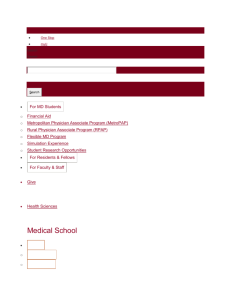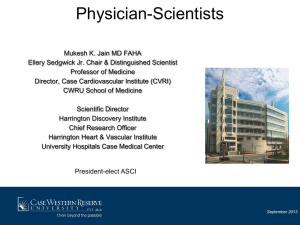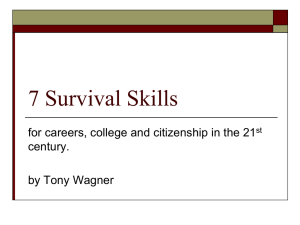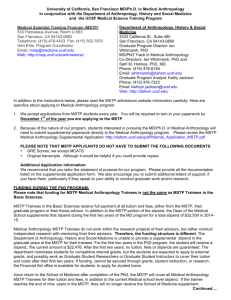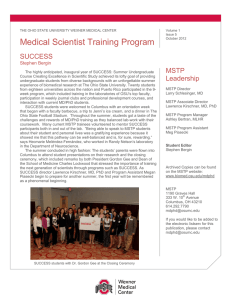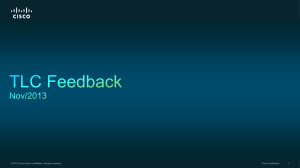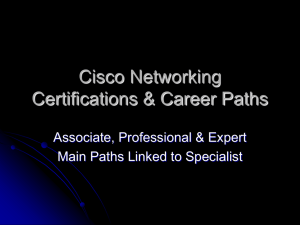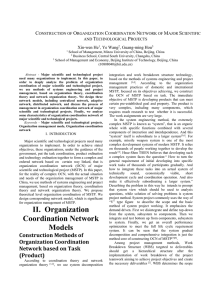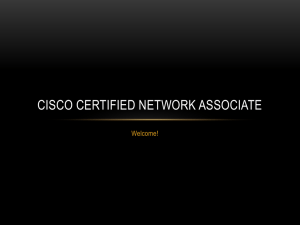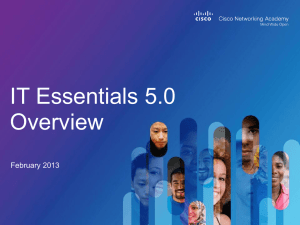Common Style Problems
advertisement
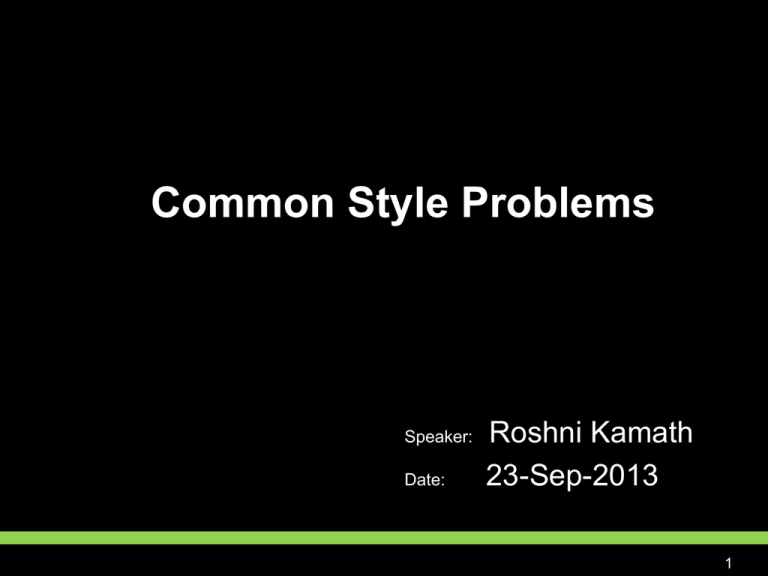
Common Style Problems Speaker: Date: Roshni Kamath 23-Sep-2013 1 Agenda • What is a style guide • Why Style guides are necessary • Common Style Problems • • • • • • • • • • • • • • • Procedures Dates Capitalization Measurements and Units of Measure Numbers Protocols Names of Special Characters Telephone Numbers Time Zones URLs, Addresses Company with Product Names Version Identifiers Readme Files and Release Notes Bibliographies Titles of Publications • MSTP vs. Chicago Manual : Comparison 2 What is a style guide A style guide provides a means of documenting basic rules or features that ensure consistency in the output. A style guide or style manual is a set of standards for the writing and design of documents, either for general use or for a specific publication, organization or field. 3 Why Style guides are necessary The implementation of a style guide provides uniformity in style and formatting within a document and across multiple documents Some organizations produce style guides for either internal or external use It is best to ascertain which guide your client prefers you to use, because there is often a “house style” to be aware of 4 Common Style Problems Procedures • • Steps in a procedure or task follow the navigational structure of the application left to right, top-down. Each step must include the menu commands, or dialog box and field names in the sentence. The top-down method determines the "big picture" (global view) of the application first and then defines its features in detail. When you want the user to Use this syntax Select an option In the Print dialog box, click All. Open a tabbed section in a dialog box In the Font dialog box, click Character Spacing Insert text in a combo box In the File name box, enter the name of the file. Select multiple check boxes On the Print tab, select the Comments and Hidden text check boxes Select items in a group box Under Include with document, select the Comments check box. 5 Common Style Problems Dates STYLE in MSTP STYLE in Chicago Style guide The February 23, 2001, issue of the New York Times May 26, 2008, was a sad day for film buffs. The February 2001 issue of MSDN Magazine the 1980s and ’90s Incorrect 23 February 2000 6/11/99 11/6/99 April 21st - no difference - 6 Common Style Problems Capitalization • Title-Capitalization: First letter of each word is a capital letter • Sentence-Capitalization: First letter of a sentence and proper nouns are capital • Headings: Follow rules as per project template or your organization style guide * When NOT to: Do not overuse capitalization. Never use all uppercase for emphasis. Examples from MSTP Examples from CISCO Style guide Click the Insert Table button. Call the Cisco Technical Assistance Center. How to Format Your Hard Disk Setting Up the RADIUS Profile for Two-Way Authentication Press the LEFT ARROW key. Ampersand key , the Ctrl-C key combination. * Use sentence-style capitalization for * In a Warning, the word on or off UI specific element. appears in uppercase (ON or OFF) 7 Common Style Problems Measurements and Units of Measure STYLE in MSTP STYLE in CISCO Style guide • • • • Do not insert periods after abbreviations of measurements except for in. (inch). Use the multiplication sign (×), not by, to specify screen resolutions Do not abbreviate units of measure except for kilobytes (KB), megabytes(MB), and gigabytes (GB) 5 inches or 5 in. 0.5 inch, 0 inches 8 bits 12 points high six 1/2-inch cables • • Use an en dash for all ranges except in indexes, text, and figures. Spell out all occurrences of micro as symbol μ) does not always appear correctly online Use the same unit-of-measure abbreviation for all quantities 1 MB, 12 MB 0.5 kg, 1 kg, 5 kg 1 cm, 6.5 cm 1 ms, 200 ms 56 to 64 kbps; 56–64 kbps 8 Common Style Problems Numbers When you want the user to Use this syntax • • Use numerals for 10 and greater. Spell out zero through nine if the number does not precede a unit of measure or is not used as input. Use numerals for all measurements, even if the number is less than 10. Use numerals for coordinates in tables or worksheets Use numerals in dimensions. Use numerals to indicate the time of day. 0 inches ; 3 feet, 5 inches 0.75 gram 35mm camera 8 bits 1-byte error value Chapter 10, row 3, column 4 00:01 (1 minute past midnight) • Use an en dash, not a hyphen, to form negative numbers. Use en dash in ranges • Hyphenate compound numbers when they are spelled out. –79 ; 10 – 9 = 1 © 1993–1994 pages 95–110 Twenty-five fonts are included • • • • 9 Common Style Problems Protocols A protocol is a standard for communication between computers Most protocols are referred to by their abbreviations o Example: Internet Explorer supports Hypertext Transfer Protocol (HTTP). In URLs, the protocol used by the Web server appears in lowercase before a colon o Example: http://www.google.co.in 10 Common Style Problems Telephone Numbers Examples from MSTP Examples from CISCO Style guide For U.S. telephone numbers, use parentheses, not a hyphen, to separate the area code from the seven-digit phone number. Inside the USA and Canada, Use the format: Area code (space) group of first three numbers (hyphen) group of last four numbers EXAMPLE Cisco Systems, Inc., Americas Headquarters, 408 526-4000 (425) 555-0150 Do not include the access code for international long distance in phone lists. Do not put a plus sign (+) in front of a phone number. (44) (71) 0000 000 0000 [U.K.] Outside the USA and Canada, Use the format: First group of numbers (space) second group of numbers (space) third group of numbers (space), and so forth. Do not use hyphens to separate these numbers. EXAMPLE Cisco Systems, European Headquarters, 33 1 6918 61 00 12 Common Style Problems Time Zones STYLE in MSTP STYLE in Chicago Style guide The names of time zones should be treated as proper nouns. A time zone is a geographical area. • • The current internationally accepted name for Greenwich Mean Time is Coordinated Universal Time (UTC). EXAMPLES: The show begins at 19:00 Pacific Time (UTC-8). Eastern Time (UTC+10) (Australia) When spelled out, designations of time and time zones are lowercased (except for proper nouns). Abbreviations are capitalized. • EXAMPLE: Please attend a meeting in Grand Rapids, Michigan, on December 5 at 10:30 a.m. (EST) • GMT : Greenwich • EST • PDT mean time : eastern standard time : Pacific daylight time 13 Common Style Problems URLs, Addresses A uniform resource locator, or URL is designed to lead a reader directly to an Internet or intranet source. A URL consists of an Internet protocol name; a domain name; and optionally other elements such as a port, directory, and file name. Each of these main elements is in lowercase type, unless case is important. URLs often appear at the end of a sentence o Examples: http://www.microsoft.com/business/ ftp://www.example.com/downloads/myfile.txt mailto:someone@example.com http://preview.cisco.com/en/US/docs/general/style/guide/latest/sg.html 14 Common Style Problems Company with Product Names Examples from MSTP Examples from CISCO Style guide On first mention, always precede the name of a product with the company name Brand names that are trademarks should be capitalized if they must be used. Examples: Trademark is the legal word for a name given to a product or service Microsoft Windows XP, Windows 2000, and Windows NT 4.0 Windows NT version 3.1 or later In technical documentation, do not use any trademark symbols with the Cisco name. Examples: The Cisco IOS software provides many performance benefits. 15 Common Style Problems Version Identifiers Product and product component names can include version information by special identifier o Examples: by year of release (Windows 2000), or by chronological version number (Windows NT 4.0). When listing different versions of a product, list the most recent version first. o Examples: Microsoft Windows XP, Windows 2000, and Windows NT 4.0 A complete product version number has three components: o • Major release identifier: X.x.x • Minor release identifier: x.X.x • Update identifier: x.x.X Examples: Internet Explorer 4.0 Microsoft Exchange Server 4.0.829 16 Common Style Problems Readme Files and Release Notes Readme files provide up-to-the-minute information about a newly released product. Release notes provide information about test and beta releases You can use the term readme file or readme with/without an extension, preferably, Readme.txt readme files should not contain jargon and overly technical language and should conform to house style Include these elements in the file, • • • • • • • • Title of the file centered in the text area, with the date Any necessary copyright notices. Introductory paragraph explaining the purpose of the file Optional section titled “How to Use This Document” Contents listing all the section headings Procedures Tables Errata and Corrections 17 Common Style Problems Bibliographies A bibliography is an alphabetically arranged list of books, articles, or other source material used in the preparation of the document. You do not need to cite a date of access for CD-ROMs and similar media. o Examples: Dupre, Lyn. Bugs in Writing: A Guide to Debugging Your Prose. Reading, MA: Addison- Wesley Publishing Co., 1995. Vijayan, Jaikumar, and Mindy Blodgett. “Train Wreck at DEC.” Computerworld. July 8, 1996, 1, 15. 18 Common Style Problems Titles of Publications • • The title page of a printed book includes the product name and the product descriptor. Online documentation can use any of the titles listed in MSTP manual Title Administrator’s Guide Companion Installation Guide Audience Content Technical support personnel, system and network administrators Task-oriented information about installing, configuring, and managing a product. End users Overview of product features. Often highly visual and informal. All users Information about how to install the product. 19 MSTP vs. Chicago Manual : Comparison MSTP is a “house -style” of Microsoft Corporation vs. Chicago manual is a generic style guide adopted by American publishing houses MSTP is more aligned to software products documentation (MS Windows oriented) vs. Chicago manual caters to all types of industries Chicago manual is an exhaustive volume available in Online and Print vs. MSTP primarily addresses document writers and users of Microsoft products MSTP and most other organizations’ style guides refer to CMS 20 References MSTP-V3_2.pdf Cisco_stylegd.pdf http://www.chicagomanualofstyle.org/access/intercept.epl?path=/forum.html http://www.futurestate.com/assets/techwriting_guidelines.pdf http://people.engr.ncsu.edu/txie/publications/writeissues.pdf 21 THANK YOU Our purpose is to inform, not to entertain. So our writing must be informational. 22
